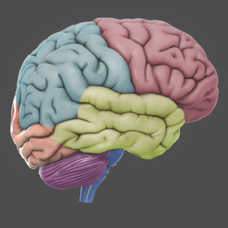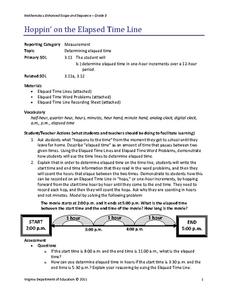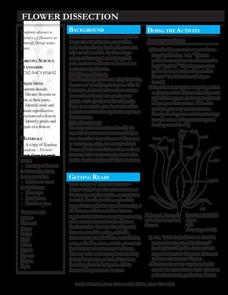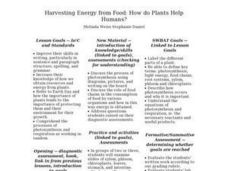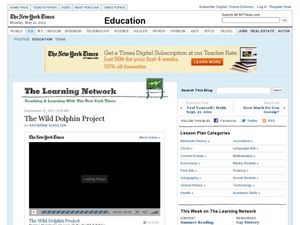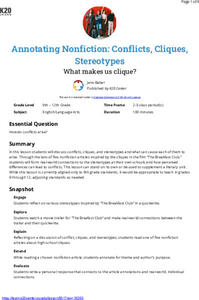Cold Spring Harbor Laboratory
3D Brain
Imagine being able to rotate the brain and view interior structures without dissection! This tool allows anatomy masters to do just that. They also learn about the associated functions, disorders, and symptoms of damage to each structure.
Curated OER
The Very Hungry Caterpillar
A good book deserves to be followed up by a good worksheet. Here is a great resource which is intended for use after reading The Very Hungry Caterpillar by Eric Carle. It includes several activity ideas that promote skill development in...
Virginia Department of Education
Hoppin' on the Elapsed Time Line
Time flies when you're teaching math! Okay, maybe not for everyone, but this lesson will have your young mathematicians calculating elapsed time before you know it.
NOAA
Into the Deep
Take young scientists into the depths of the world's ocean with the second activity of this three-part earth science series. After first drawing pictures representing how they imagine the bottom of the ocean to appear, students...
Core Knowledge Foundation
A Time for All Seasons - Spring
Celebrate the arrival of spring with this fun primary grade science unit. Engaging young scientists with a variety of hands-on activities and inquiry-based investigations, these lessons are a great way to teach children about seasonal...
Del Mar College
Divisibility Rules
There's a lot to remember when it comes to math concepts. Help scholars get a head-start to learning division with a reference page offering divisibility rules for the numbers two, three, four, five, six, eight, nine, and 10.
Curriculum Corner
Inferencing
Inferencing is a necessary reading skill to uncover non-explicit messages in text. Use the set of resources as a way to guide learners toward becoming expert inferrers through reading prompts and literature with text and without text.
Curated OER
Flower Dissection
Beginning biologists pull a flower apart and familiarize themselves with the different reproductive structures. Why have them learn only from just a book or diagram when they can examine real samples? There is no link to the referenced...
Curated OER
Harvesting Energy from Food: How do Plants Help Humans?
Beginning botanists view slides of plant vascular tissue. They watch Magic School Bus Gets Planted, which you can find online, and then write a summary of what they have learned about plants. This lesson could be used with upper...
Curated OER
The Wild Dolphin Project
Inspire young marine biologists to study animals in the wild with this assignment. Pupils view an eight-minute video and read an article in the New York Times about Denise Herzing's 25-year long study of dolphins in their own natural...
Curated OER
Kinds of Sentences
What is a declarative sentence? Interrogative sentence? If your middle schoolers are asking these questions, it's time to learn them once and for all! Start by reading through the information provided at the top of the page, and then...
Curated OER
Appositives and Present Participle Phrases (-ing word groups)
Combine sentences with the help of this grammar resource! Learn how to combine sentences using appositives and present participle phrases. The first page focuses on combining two sentences and creatine one. On page two, writers practice...
Curated OER
Clauses and Compound Sentences
Sentence variety is extremely important when it comes to learning the written word. Add variety to your learners' writing by focusing on clauses and compound sentences. The information provided is followed by a practice opportunity to...
K20 LEARN
This Is How the World Ends: Coronal Mass Ejections/Space Storms
Is this the end of the world as we know it? Pupils prepare for a coronal mass ejection during a lesson from the K20 Center. The activity combines video and Internet research in a collaborative assignment that focuses on public safety...
K20 LEARN
Speedy Cat: Enzymes
Enzymes have a need for speed! What happens when they are forced to slow down? A well-rounded lesson plan from the K20 Center examines enzyme activity through role playing and a lab. Biology scholars work in teams and pairs to understand...
K20 LEARN
Rules Of The Mogwai: Lab Safety And Chemical Properties
When you don't follow the rules, bad things can happen! Kick off your next lab safety lesson using a resource from the K20 Center. Pupils partner up to decipher MSDS for common lab chemicals, brainstorm common safety rules and their...
Nemours KidsHealth
Cyberbulling: Grades 6-8
Cyberbullying is the focus of two lessons. First, scholars discuss what cyberbullying is, and examine a problem-solving approach to handling cyberbullying, then create brochures on the topic. Second, pupils discuss the effects...
John F. Kennedy Center
Harriet Tubman: Retelling History Through Dance and Drama
Scholars listen to several pieces of music in preparation for a discussion about how instruments and lyrics convey emotions. With Harriet Tubman as the focus, small groups create an original song or dance. A reflection piece concludes...
K20 LEARN
Annotating Nonfiction - Conflicts, Cliques, Stereotypes: What Makes Us Clique?
John Hughes' The Breakfast Club takes center stage in a lesson about annotating nonfiction texts to keep track of evidence that may be used later in discussions and writings. Scholars consider the stereotypes and conflicts presented in...
K20 LEARN
Can You Tell Me Tales? Themes In Literature
"The Wife of Bath's Tale" and "The Pardoner, His Prologue, and His Tale" from Chaucer's Canterbury Tales take center stage in a lesson that asks scholars to update the tales, craft a script, and either video their version or act it out...
Curated OER
Learning the Days of the Week
Students sing a song during group time each day to learn the names of the days of the week. They learn the song lyrics and sing them often.
Curated OER
Circles
Students graph circles. In this graphing lesson students write equations for circles. Students solve equations for circles and graph the results.
Curated OER
Construction Starts on Freedom Tower
Students are introduced to an image of Freedom Tower, then read a news article about the construction of this building that will be completed in 2011. In this current events instructional activity, the teacher introduces the article with...
Curated OER
Comparing Chimp mtDNA to Learn about Races
In this computer-based lesson, students will measure genetic diversity within and between three subspecies of chimpanzees in order to gain a better understanding of genetic distinctiveness and explore race as a genetic concept.
Other popular searches
- Science Learning Centers
- Math Learning Centers
- Hands on Learning Centers
- Measurement Learning Centers
- Space Learning Centers
- Literacy Learning Centers
- Alphabet Learning Centers
- Ideas for Learning Centers
- Electricity Learning Centers
- Hand Math Learning Centers
- Easy Math Learning Centers
- Planet Learning Centers


